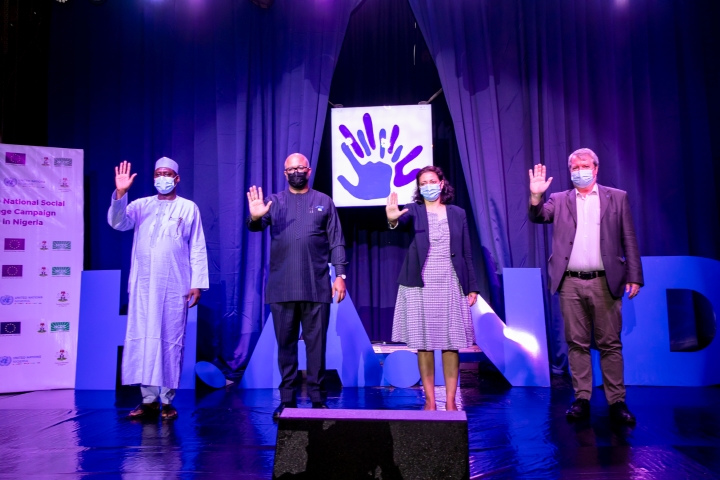
Centre for Communication and Social Impact (CCSI), an indigenous Non-Governmental Organisation (NGO) has received technical support from the Federal Government and the United Nations in Nigeria to implement a national social behaviour change campaign on COVID-19, tagged the POWERFUL H.A.N.D.S campaign.
Launching the POWERFUL H.A.N.D.S campaign, the Minister of Health, Dr Osagie Ehanire, represented by the Director-General, Nigeria Centre for Disease Control (NCDC), Dr Chikwe Ihekweazu, commended all stakeholders for the successes recorded so far, but stressed that citizens’ behaviours continue to be very important in the efforts to check the spread of the pandemic in the country.
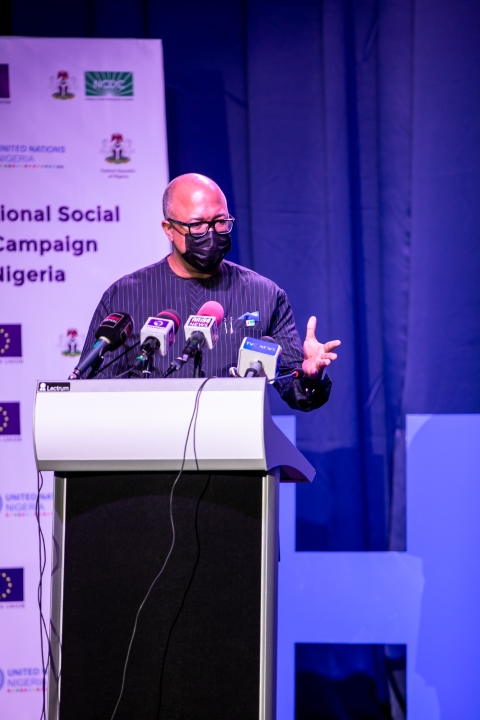
While presenting the keynote address, Dr Chikwe said that the third wave of the coronavirus is not inevitable in Nigeria and part of the measures taken by the government is to stop flights coming in from high-impact countries.
“The third wave is not inevitable, some countries haven’t even had one wave because of the work they have done, so our work is focused on preventing the third wave from happening and that is in our collective hands. And government, like you have seen over the last few weeks, has been very proactive. We stopped travel to some high incident countries,” he said.
The NCDC Director further stressed that the Federal Government had made some very difficult decisions like stopping people from coming back from a friendly, collaborating country.
“So, we have made some very hard decisions as a government to protect ourselves, we have reinstituted the guidelines, reminding everyone of what they are, the Presidential Steering Committee continues to meet, continues to drive policy so we are very determined as much as possible to avoid the third wave.
“Although we continue to see declines in COVID-19 cases in Nigeria, we must not return to complacency. The Powerful H.A.N.D.S campaign which we are here to launch may seem so simple compared to diagnostics, therapeutics and vaccines, but I am so grateful we all recognise how critical the H.A.N.D.S acronym is,” Dr Ihekweazu said.
“Social and Behaviour Change (SBC) is the bedrock in sustainable gains in improving the health and wellbeing of society and family. And once you get these pillars of changing behaviours right, it is easy to build the other components of the campaign” – Ms. Fagbemi.
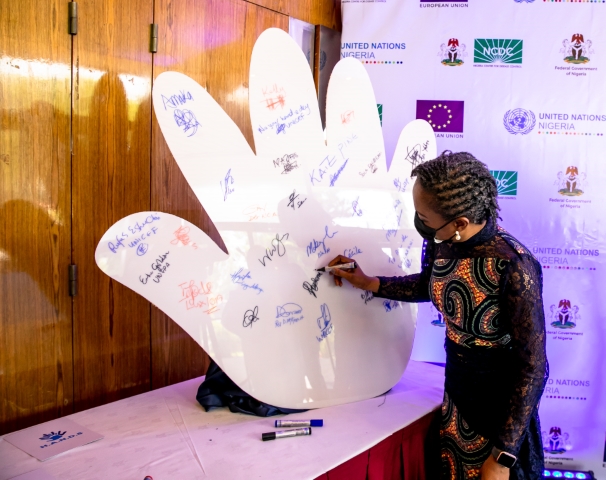
The POWERFUL H.A.N.D.S acronym means
H – Have your hands washed or sanitized frequently
A – Always cough or sneeze into your elbow
N – No going out without a face mask
D – Distance of at least two arm’s length should be maintained
S – Stay indoors and self-isolate if you feel sick
The launch of the campaign, which is being implemented by CCSI, with technical support from the Federal Government and the United Nations in Nigeria is a four-month campaign and aims to stimulate collective actions to prevent the further spread of COVID-19 in Nigeria, change and sustain long term preventive behaviours like hand washing with soap under running water, alongside other nonpharmaceutical preventive measures.
Through enhancing risk perception and building confidence in preventive behaviours, the campaign received funding from the European Union (EU) to create awareness in two Local Government Areas (LGAs) of the seven COVID-19 hotspot states across the country, Lagos, FCT, Plateau, Kaduna, Oyo, Rivers and Kano.
Addressing the media, the Executive-Director, Centre for Communication and Social Impact (CCSI), Mrs Babafunke Fagbemi, emphasized the need to review the sense of apathy and the seeming hopelessness in communities by inoculating fresh messages that will give hope and let Nigerians have more confidence to practise the promoted H.A.N.D.S behaviours. 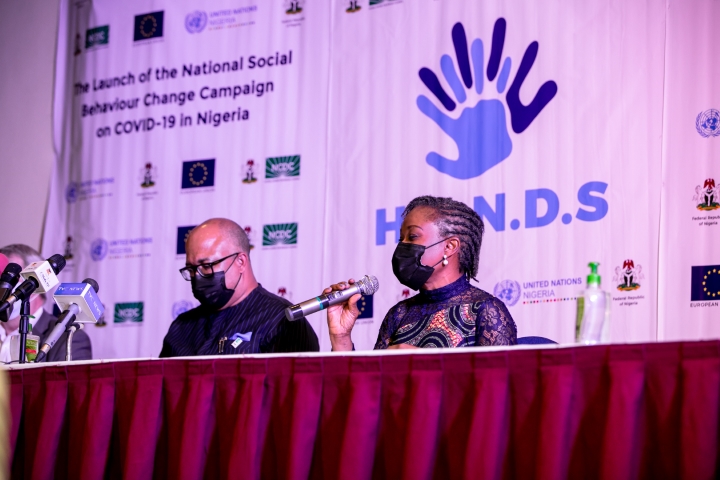
Babafunke noted: “Social and Behaviour Change (SBC) is the bedrock in sustainable gains in improving the health and wellbeing of society and family. And once you get these pillars of changing behaviours right, it is easy to build the other components of the campaign.
“CCSI will be collaborating with the Risk Communication and Community Engagement (RCCE) pillars in the seven target states to engage prominent stakeholders in two hot spot LGAs to promote the key behaviours of the campaign to prevent further transmission of COVID-19.”
Speaking on the value of partnership to address the challenges of COVID-19 in Nigeria, Head, EU Delegation in Nigeria, Mr Ketil Karlsen, said that the EU and its member states in Europe had mobilised 38.5 billion euros in response to the fight against COVID-19 pandemic worldwide.
Karlsen, represented by Head of Partnership, EU, Cecile Tassin-Pelzer, said the union had also supported Nigeria with over four million doses of vaccines and allocated 50 million Euros to complement government efforts in addressing COVID-19.
Similarly, a representative of the five joint UN agencies in Nigeria, UNICEF Country Representative, Peter Hawkins, urged the media to amplify their voices in the campaign towards eliminating COVID-19 pandemic.
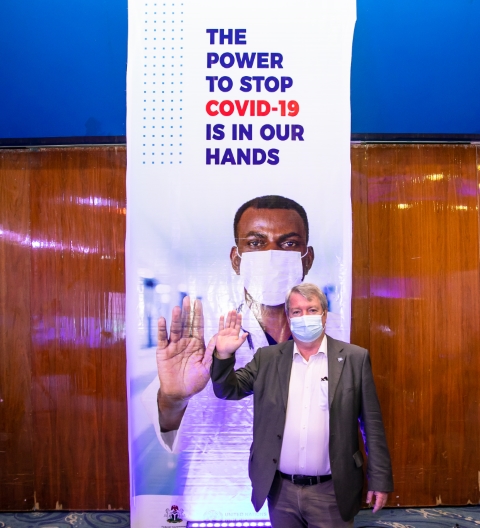
Hawkins highlighted the three elements in the campaign, which include: mass media on enforcing the messages, educating schools and community engagement on COVID-19 as the focal points in the campaign.
The Director-General, National Orientation Agency (NOA), Dr Garba Abari, also highlighted the need for social behaviour change to fight the COVID-19 pandemic. Abari, while urging the media to create more awareness on the pandemic, encouraged Nigerians to access only credible information on COVID-19 from reliable sources.
The Director Public Health, Federal Ministry of Health, Dr Morenike Alex-Okoh, in her remarks, acknowledged the critical role of the media in generating and creating awareness on an issue of public interest such as COVID-19. She noted that media engagement is one of the strategies to promote adherence to preventive behaviours at all levels and contribute to stopping the transmission of the pandemic.
Represented by Director, Health Promotion Division, Dr Ladi Bako-Aiyegbusi, Dr Morenike said: “Our continual partnerships will be the game changer in the campaign against COVID-19. We count on the partnership and continuous support of all stakeholders in achieving this great vision of harnessing media structures to successfully promote positive health-seeking behaviours. 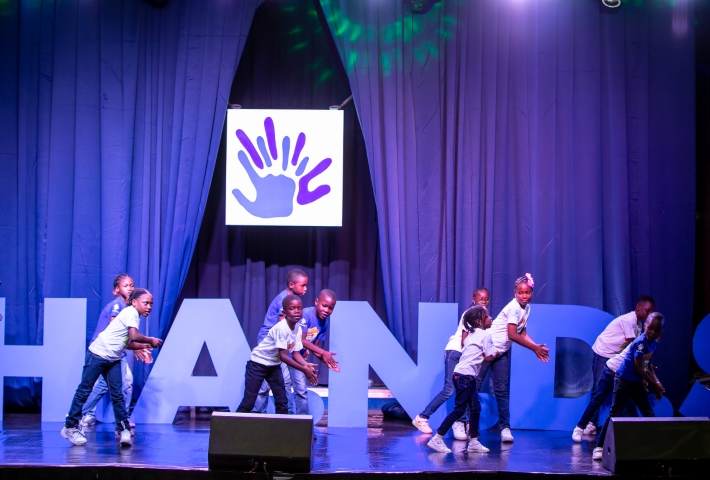
Some of the other highlights of the campaign launch included the inauguration of the edutainment elements of the campaign like the theme song composed by Nigeria singer and songwriter, Teniola Apata, popularly known as Teni the Entertainer and a presentation by students of LightForce Scholar’s Academy International, Abuja.
The Minister also unveiled the Super Hero character called “Captain Bubbles” which is aimed at encouraging children to take up the habit of hand washing and other key hygiene practices through an animated video.
2 thoughts on “COVID-19: CCSI launches FG, UN, EU supported behaviour change campaign”
Pingback: Promoting prevention and control of Malaria
Pingback: Women's Day: Equity Is Not Just Nice-To-Have, It's A Must-Have • Centre For Communication and Social Impact